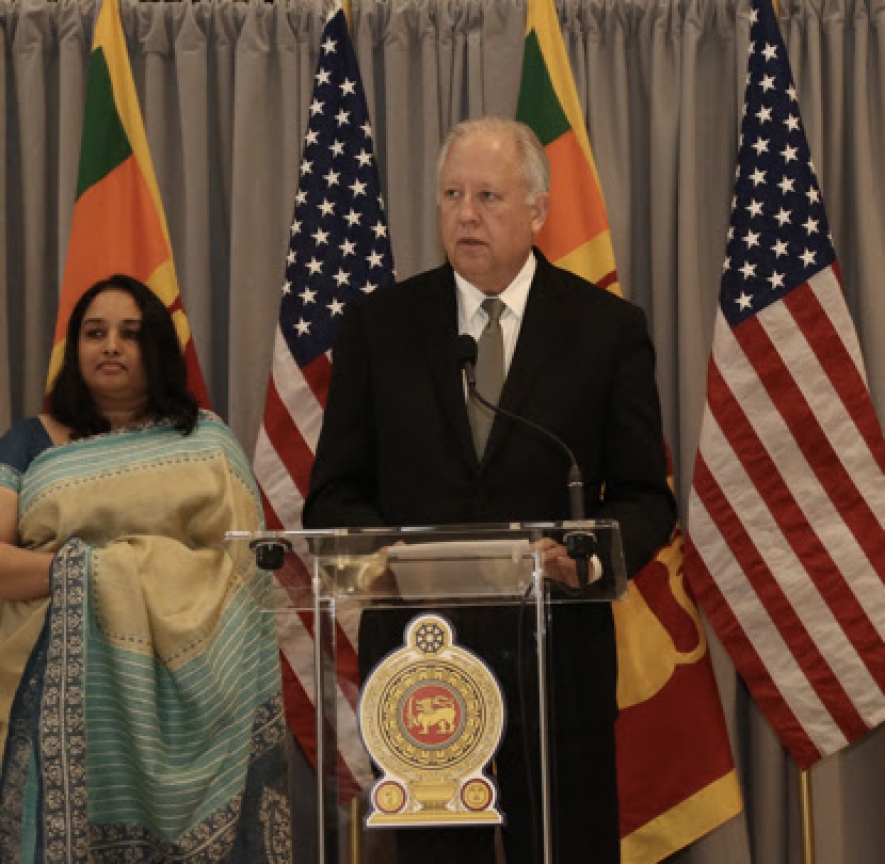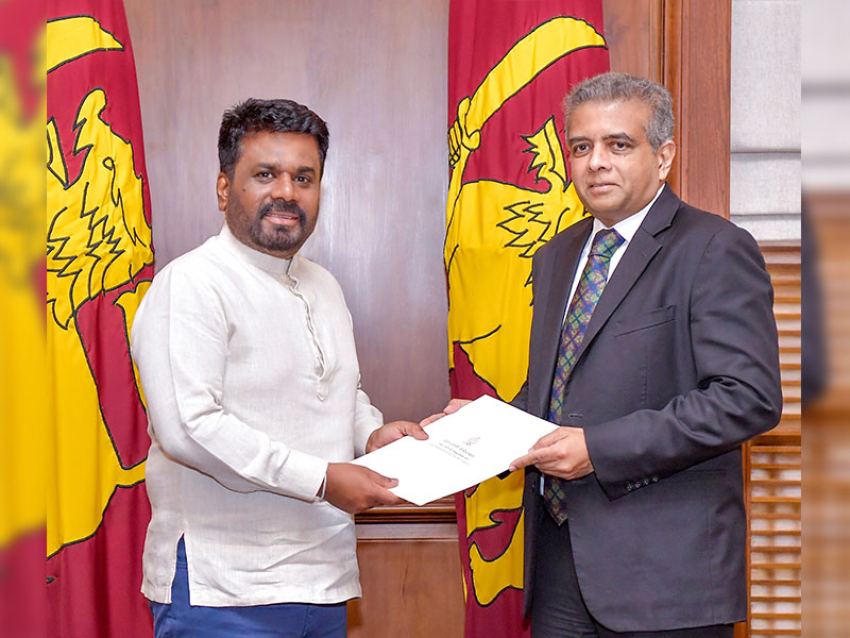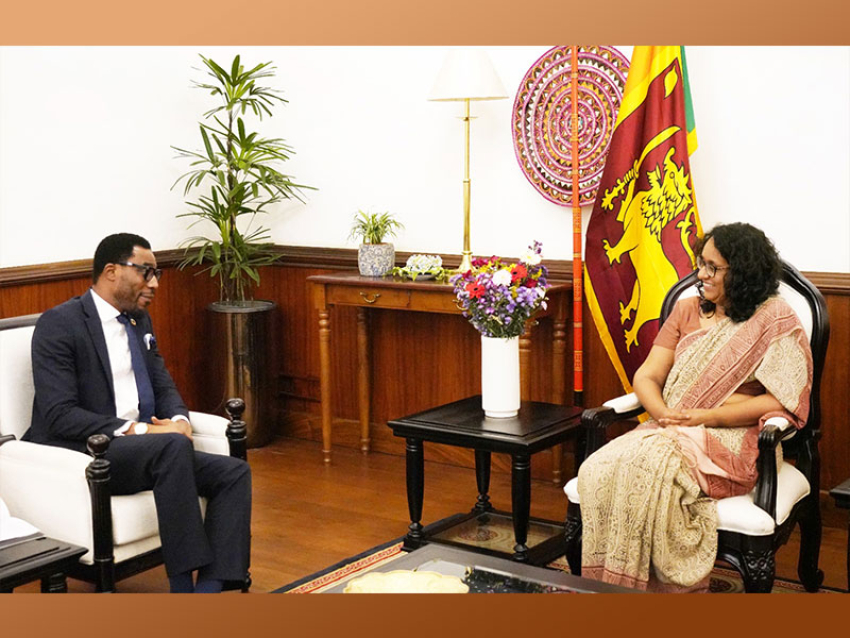The Embassy of Sri Lanka in Washington D.C. celebrated the nation’s 70th Anniversary of Independence at the prestigious United States Institute of Peace.
The event also marked 70 years of diplomatic relations between the two countries.
Noting the remarkable partnership between the United States and Sri Lanka, Ambassador Shannon said bilateral cooperation remains on an upward trajectory and there is “great potential for our two countries to do much more. To work with partners to promote responsible infrastructure development that benefits Sri Lanka. To work together to enhance the shared objectives of security and stability in the Indo-Pacific region, the importance of which President Trump, Secretary Tillerson, and our National Security Strategy have all underscored.”
Ambassador Shannon also reminisced on Sri Lankan statesmen of yesteryear and their remarkable contributions to shaping global diplomacy after the Second World War. He recalled how the delegation of Ceylon played a vital role in talks toward reconciliation between Japan and the Allied forces in the postwar treaty negotiations in San Francisco. He said “As the beneficiaries of the long years of stability that followed, we all owe a debt of gratitude to these leaders’ judiciousness and foresight and to what President Reagan later hailed as “heartfelt commitment” to “democratic ideals” and “the principle of freedom for all people.”
Chargé d’affaires a.i. of the Embassy of Sri Lanka Priyanga Wickramasinghe addressing the gathering said that Sri Lankans are very proud of their country’s democratic heritage. She said Sri Lankans have always had faith in the island’s democracy and its democratic institutions. She stressed that this strong confidence in democracy and democratic governance will be the cornerstone of Sri Lanka’s future progress.
Underlining the importance of the U.S.-Sri Lanka relationship Chargé d’affaires Wickramasinghe said the very old friendship between the two countries is now stronger than ever.
Over 500 invitees attended the event including guests from the Washington-based foreign diplomatic corps, senior officials from the U.S. administration as well as many Sri Lankan-Americans.
In the morning of February 4, the Embassy hosted a solemn independence commemoration event with multi-faith observances conducted by religious dignitaries representing the Buddhist, Hindu, Islam and Christian faiths.
Remarks by Under Secretary Thomas Shannon:
Good evening, what a tremendous pleasure and honor to be here celebrating the 70th national Independence Day here at the US Institute for Peace, in this beautiful venue, and with so many beautiful people. Thank you for your very kind words of introduction, Madame Chargé, you’ve done incredible work here, during an incredible time and I congratulate you, thank you.
To Members of our Congress, to Peace Corps Acting Director Sheila Crowley, to Deputy Assistant Secretary of Defense Joseph Felter, ladies and gentlemen, friends and colleagues, I am deeply honored to have the opportunity to join all of you here this evening on the occasion of Sri Lanka’s National Day.
Tonight, as Madame Chargé noted, we commemorate 70 years of Sri Lanka’s independence. This year will also mark the 70th anniversary of the establishment of diplomatic relations between our two countries. Just as the United States is proud to have been among the first nations to recognize an independent Ceylon in 1948, we remain proud to stand with Sri Lanka as a friend and partner today.
The Embassy of Ceylon first opened here in Washington three years after the conclusion of World War II, at a time when the world desperately needed new measures both to prevent the recurrence of that terrible catastrophic war and to secure future peace and prosperity. So, it seems fitting that we should celebrate Sri Lanka’s birth in the halls of the United States Institute for Peace.
At postwar treaty negotiations in San Francisco in 1951, the delegation of Ceylon led by Ceylon’s first ambassador to the United States, Sir Claude Corea, helped the talks toward reconciliation between Japan and the Allied forces. For those of you who don’t know your history, the intervention of the Ceylon delegation was profound and powerful, and changed the nature of those negotiations. They created the basis upon which the Allies concluded a treaty of peace with Japan, and laid the basis on which the United States with Japan have built one of our most important alliances and friendships. And so we are grateful for diplomacy then, and we are grateful for diplomacy now.
As the beneficiaries of the long years of stability that followed, we all owe a debt of gratitude to these leaders’ judiciousness and foresight and to what President Reagan later hailed as “heartfelt commitment” to “democratic ideals” and “the principle of freedom for all people.”
Today, in much the same spirit, Sri Lanka’s leadership has charted a path to postwar justice and reconciliation at home, one that if followed to its conclusion offers the promise of peace, freedom, and prosperity for all of Sri Lanka’s people.
The United States commends the steps that Sri Lanka has taken to date toward justice, reconciliation, and accountability. With your continued progress, our bilateral relationship will continue to grow.
This past September, I had the honor of meeting President Sirisena during the UN General Assembly, and in November, I had the pleasure of talking with him again in Colombo where I also met with the Prime Minister.
I also had the pleasure of reuniting in Colombo with Foreign Secretary Kariyawasam, a friend of so many of us from his tenure in Washington, to co-lead with him the second U.S.-Sri Lanka Partnership Dialogue. Each occasion served to reaffirm the broad range of cooperation that already exists between our two countries, whether in law enforcement, counterterrorism, rule of law, demining, entrepreneurship, private sector development, health, transitional justice, or humanitarian assistance.
This cooperation remains on an upward trajectory. As I announced in Colombo, and as Madame Chargé just noted, the United States has approved the transfer to Sri Lanka of a Coast Guard Secretary Class cutter. In addition, the U.S. Department of Agriculture is initiating a $21 million program to enhance the productivity of Sri Lanka’s dairy sector, and the U.S. Peace Corps will return American volunteers to Sri Lanka to teach English. The Millennium Challenge Corporation continues to work toward conclusion of a compact with Sri Lanka.
This is an impressive list but I see great potential for our two countries to do much more. To work with partners to promote responsible infrastructure development that benefits Sri Lanka. To work together to enhance the shared objectives of security and stability in the Indo-Pacific region, the importance of which President Trump, Secretary Tillerson, and our National Security Strategy have all underscored.
We face a bright future, one that is ours to grasp. Even as we look forward, however, we would do well to draw inspiration from Ambassador Corea and our other forebears whose foresight, wisdom, and “heartfelt commitment” to democratic ideals and freedom guided the opening days of our diplomatic relations 70 years ago.
Thank you all for your presence tonight, Madame thank you for the invitation to be here, and congratulations on 70 years of Sri Lankan independence.



















